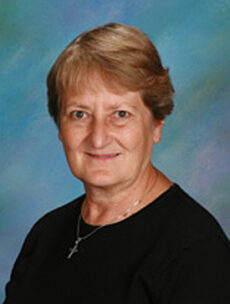When we share what we have, we have met Jesus

Sister Rachel Bergschneider, OSB
By Sister Rachel Bergschneider, OSB
Solemnity of Our Lord Jesus Christ, King of the Universe/Nov. 22
Ezekiel 34:11-12,15-17; Psalm 23:1-2,2-3,5-6; 1 Corinthians 15:20-26,28; Matthew 25:31-46
A young boy was walking through the park after attending religion classes. He couldn’t stop thinking about the lesson for that day on Jesus’ parable about the last judgment. What impressed him most was when the teacher said, when you give something to another person, you’re really giving it to Jesus.
As he walked along, he noticed an old woman sitting on a bench. She looked lonely and hungry. He sat down next to her, took from his pocket a chocolate bar he had been saving, and offered some to her. She accepted with a smile. He liked her smile so much that after she had eaten her piece of chocolate he gave her more. This time they exchanged smiles and sat together in silence, just smiling at each other.
Finally, the boy got up to leave. As he began to walk away, he turned, ran back to the bench, and gave the woman a big hug. And she gave him her very best smile. When he arrived home, his mother saw a big smile on his face. “What made you so happy today?” He said, “I shared my chocolate bar with Jesus. And she had a great smile.”
Meanwhile, the old woman returned to her little apartment where she lived with her sister, “You’re all smiles,” said the sister. “What made you so happy today?” She replied, “I was sitting in the park, eating a chocolate bar with Jesus. And, you know, he looks a lot younger than I expected.”
Today we celebrate the Feast of Christ the King. For years, I pictured Jesus sitting on the throne separating the sheep from the goats. Matthew 25:31-46 is a dramatic scene. But as I study Jesus’ words and actions in the Gospels, that dramatic scene of judgment is really enacted during Jesus’ ministry.
As Jesus walks among the people, he is demonstrating what he says in the judgment scene. He explains his mission by offering acceptance, compassion, and forgiveness; he warns those who block his ministry of healing and curing; he condemns the hypocrisy of those who think they know the truth.
SEEING CLEARLY
Jesus did not make this dramatic statement of judgment to frighten us into good works. He knew that encounters with the marginalized expand our hearts and vision — a vision that can bring us to the face of God.
When we get caught into keeping score of our accomplishments so that we can pass the judgment test, we lose sight of the message of Jesus. He calls us to work with Him in bringing about the kingdom of God on earth by compassion toward all, helping to heal wounds of division, caring for the least among us. We build the kingdom by knowing that each person we meet is the face of God.
There is a story that comes from Africa. An anthropologist invited children from a tribe to play one game. He placed a basket of fruit near the trees and addressed the children: “The one of you who reaches the tree first will be rewarded with all the sweet fruits.” When he signaled to the children to start the race, they locked their hands tightly and ran together, and then they all sat together and enjoyed the delicious fruit.
The astonished anthropologist asked the children why they all ran together, because each of them could enjoy the fruit for himself. To which the children replied: “Obonato.” Is it possible for one to be happy if everyone else is sad? “Obonato” in their language means: “I exist because we exist.”
When we share with each person we meet the “chocolate bar” of respect and the good fruit of the Lord, we can become people of peace, knowing that it is truly Jesus we meet.
—
Sister Rachel Bergschneider, OSB, is a member of the Sisters of St. Benedict of St. Mary Monastery, Rock Island. She ministers at the Peoria County Jail, serving as a facilitator in the Jobs Partnership program.





